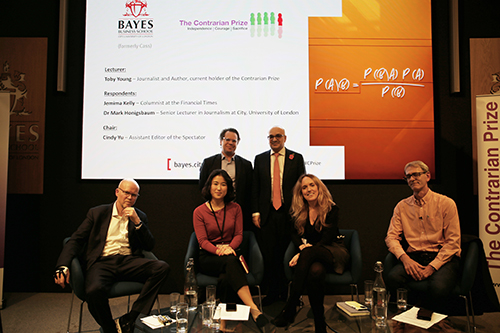Supporters and critics of the postponed Higher Education Freedom of Speech Act (HEFSA) argue the pros and cons of the legislation at a panel event at City St George’s.
By City Press Office (City St George's Press Office), Published (Updated )
Is freedom of speech under threat in British universities, and how can it be protected?
A panel of speakers with differing views gathered at City St George’s, University of London to debate the Higher Education Freedom of Speech Act (HEFSA).
Designed by the former Conservative administration, HEFSA was due to be implemented in August 2024 but has now been suspended by the new government following its election win.
The Free Speech Union, founded in 2020 by Toby Young, Associate Editor of The Spectator, is planning to appeal this suspension.
The postponed Act aimed to enshrine in law the rights of academics and visiting speakers on university campuses to put forward “controversial opinions” without risking their jobs, or receiving harassment.
Proponents of the Act believe it is necessary following controversies around examples of gender-critical or pro-Israel speakers being uninvited or protested on universities campuses.
Critics of the Act have labelled it a “hate speech charter”, arguing it undermines the right of students and academics to protest.
“Freedom of speech in Higher Education: where next?” event
Around 70 audience members attended the event, including members of the public, academics, journalists and civil servants.
The panel was introduced by Ian Pace, Professor of Music, Culture and Society at City St George’s and Co-convenor of City’s Academics for Academic Freedom (AFAF) group.
Amnon Aran, Professor of International Politics of the Middle East at City St George’s moderated the event.
The panellists were:
- David Abulafia, Professor of History at Cambridge University
- Jim Dickinson, Associate Editor at Wonkhe, a higher education sector website
- Ewan McGaughey, Professor of Law at King’s College London
- Akua Reindorf KC, Barrister at Cloisters Chambers, Visiting Senior Fellow at London School of Economics
- David Ruebain, Professor of Culture, Diversity and Inclusion at the University of Sussex
- Michelle Shipworth, Associate Professor at the UCL Energy Institute
All speakers’ opinions were their own rather than a reflection of their employers.
Each speaker agreed that the issue of freedom of speech was primordial within universities but came to different conclusions on how to protect it.
One audience member thanked the event organisers for “running a panel event with genuinely diverse views,” and the event was subsequently featured in The Telegraph and in Wonkhe.
Professor Pace provided background in an introduction. He said:

External involvement of the Office for Students (OfS) adds impartiality to the debate
For proponents of the Act, the additional layer of scrutiny of an external body (such as the OfS) would add impartiality to any cases in which freedom of academic expression is being disputed.
Professor Abulafia (History Professor, Cambridge University) argued in favour of HEFSA, which would allow the Office for Students (OfS) to judge individual cases of freedom of speech breaches rather than leaving universities to come to decisions internally. He believes the involvement of the OfS would add an additional layer of impartiality and says HEFSA would protect minorities against increasing cases of harassment.
Ms Reindorf (Barrister) believes the Act would clarify and streamline existing law, giving universities a clearer framework with guidance from OfS to help universities better navigate topics of EDI protections.
Associate Professor Shipworth (UCL Energy Institute) taught a module called "Data detectives” which was cancelled following a foreign student’s complaint on its content. She argues this equates to an impingement on her academic freedom and constitutes foreign influence over British universities’ curricula. She argued HEFSA would have allowed her to appeal the decision.
The threats to free speech lie elsewhere: government crackdowns on protest and undemocratic governing bodies
Detractors of the HEFSA, however, felt the Act detracted from true threats on freedom of expression, such as tighter rules around the right to protest and the proliferation of unelected governing bodies.
Jim Dickinson (Associate Editor, Wonkhe) pointed towards the OfS’s failure to tackle universities who did not provide adjustments to students with disabilities as an example of its inability to enforce regulation like the HEFSA. He added that there was nothing new about student no-platforming (disinviting or protesting controversial speakers at campus events), citing student protests against South Africa’s Apartheid regime in the 1980s.
Professor Ewan McGaughey (Law Professor, King’s College, London) suggested that the HEFSA would stoke expensive and divisive litigation when we need to restore civil discourse, and raise university pay. Far better measures to protect freedom of speech would be to increase academic autonomy and democracy, for UCU to fight for workers’ rights, and end Tribunal delays. He argued the biggest threats to freedom of speech are the de-funding, de-democratisation, and de-legitimisation of universities which the former government, inspired by the US far-right, have carried out. He suggests we ensure university governing bodies are majority-elected by staff, ensure public education is publicly funded, and strengthen autonomy and security through academic boards.
Professor Ruebain (ECDI Professor, Sussex) is his University’s Free Speech Officer and argued some proposals in draft guidance made under the HEFSA may conflict with the Equality Act, and that there are overlapping jurisdiction between charity commissions, courts and tribunals as well as complexity in different legal frameworks which don't easily lend themselves to resolution through more law. He suggested universities implement projects like UCL’s “disagreeing agreeably programme” and Sussex's Open Listening Programme.



